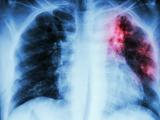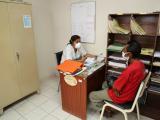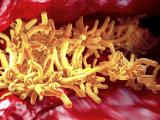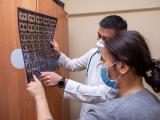May 31, 2007 (CIDRAP News) – As information piled up in the case of a man with a rare and dangerous form of tuberculosis (TB) who took multiple international air trips, it was revealed today that he is a lawyer and the son-in-law of a microbiologist who studies TB at the Centers for Disease Control and Prevention (CDC).
The patient, who has extensively drug-resistant TB (XDR TB), was identified in news reports today as Andrew H. Speaker, 31, an Atlanta lawyer. This afternoon, the CDC issued a news release in which Robert C. Cooksey, a research microbiologist in the CDC's Division of Tuberculosis Elimination, announced that he is Speaker's father-in-law and said Speaker did not contract TB from him or from CDC labs.
Speaker became the subject of the CDC's first forcible isolation order since 1963 after he returned to the United States from a wedding trip to Europe that involved not only two transatlantic flights but also several international flights in Europe. His case has also triggered a hunt for airline passengers who may have been exposed to XDR TB.
The CDC announced on May 29 that Speaker, acting against medical advice, had flown from Atlanta to Paris on May 12 and from Prague to Montreal on May 24, thereby putting dozens of fellow passengers at risk for the dangerous infection. At that point health officials knew he had multidrug-resistant TB but didn't know it was XDR TB, according to the CDC.
After he returned from Canada to the United States by car, the CDC reached him by phone, and he voluntarily went to a hospital in New York City, where he was ordered into isolation. The CDC subsequently flew him to Atlanta, where he was held in isolation at a hospital. A CBS News report today said Speaker has been taken to National Jewish Medical and Research Center in Denver, which specializes in respiratory diseases.
Cooksey, in the CDC statement today, said he is a 32-year CDC veteran and studies a wide range of bacteria, including those that cause TB. "As part of my job, I am regularly tested for TB," he stated. "I do not have TB, nor have I ever had TB. My son-in-law's TB did not originate from myself or the CDC's labs, which operate under the highest levels of biosecurity.
"I wasn't involved in any decision my son-in-law made regarding his travel, nor did I ever act as a CDC official or in an official CDC capacity with respect to any of the events of the past weeks," he continued.
"As a parent, frequent traveler, and biologist, I well appreciate the potential harm that can be caused by diseases like TB. I would never knowingly put my daughter, friends or anyone else at risk from such a disease."
XDR TB is described as TB that is resistant to the two most important first-line TB drugs (isoniazid and rifampin) and the two most important second-line drugs (a fluoroquinolone and an injectable agent—amikacin, kanamycin, or capreomycin), according to the CDC. The agency says 49 cases of XDR TB occurred in the United States between 1993 and 2006.
Both regular TB and XDR TB are believed to spread when TB bacilli from a person with the disease become aerosolized as a result of coughing, sneezing, speaking, or singing, the agency said. The bacilli can float in the air for several hours, and those who breathe them in can become infected. Patients may survive the disease if they have excellent medical care, but it is often fatal where medical care is limited, the CDC has said.
TB manifests itself slowly, and Speaker remains in apparent good health, according to the CDC and news reports. Officials said his infectiousness appears to be low (but not zero), since TB bacilli have not yet shown up in microscopic examination of his sputum.
His infection was discovered in January when a chest x-ray obtained for unrelated reasons revealed a lesion in his right lung, CDC officials said during a news briefing yesterday. Subsequently a culture revealed that he had TB, and initial drug treatment proved ineffective, said Dr. Martin Cetron, director of the CDC's Division of Global Migration and Quarantine.
In a meeting with Fulton County health officials and his doctors on May 10, Speaker was told that he had multidrug-resistant TB and was advised not to make his planned trip to Europe, Cetron said yesterday. But because of what CDC officials have called "compelling personal reasons," he made the trip anyway. From an interview with the patient, the Atlanta Journal-Constitution reported yesterday that the purpose of the man's trip was his wedding and honeymoon.
While he was in Europe—on or around May 22—the CDC learned that Speaker had XDR TB, Cetron said yesterday. That led to frantic attempts to reach him and keep him from taking any more commercial flights. But officials failed to intercept him until he was back in the United States.
Focus is on transatlantic flights
During yesterday's briefing, the CDC filled in many details about Speaker's airline flights and the overall sequence of events.
Officials said the patient took five flights within Europe, in addition to his two transatlantic flights. However, the agency is focusing mainly on contacting those who were on the transatlantic flights, because the risk of TB transmission in short flights is much lower than on long flights.
Previous investigations showed that "flights shorter than 8 hours in duration did not pose a significant risk, and so we're really concentrating on those prolonged flights," Cetron said.
As reported previously, Speaker flew from Atlanta to Paris on Air France Flight 385 and from Montreal to Prague on Czech Air 0104.
The Air France flight had 433 passengers and 18 crew members and may have lasted as long as 13 hours, Cetron reported. According to World Health Organization (WHO) guidelines, passengers in the two rows fore and aft of a TB patient are most at risk for infection. That means about 40 to 50 passengers from that flight, plus the crew, are at risk, Cetron said.
He said the patient probably sat "somewhere around row 51," but investigators were still trying to pin down his seat number yesterday.
Concerning the flight from Prague to Montreal, Canadian officials have obtained a passenger manifest and determined that the patient sat in seat 12C, Cetron said. He said the flight had 191 passengers and 9 crew members, and about 30 passengers would have been in the at-risk part of the cabin. That flight also lasted more than 8 hours.
The CDC hopes to reach as many of the passengers as possible and advise them to undergo an initial TB test and a follow-up test 2 months later. But officials said that getting the passenger lists from the airlines and then tracking the passengers down is a slow, difficult process.
As of yesterday, the agency hadn't succeeded in finding any of the at-risk passengers through its own investigation, though some had begun to come forward as a result of news reports on the case, Cetron said.
He noted that the CDC is currently working on new quarantine rules that would enable the agency to access electronic passenger manifests within 24 hours after a plane's arrival. The regulations were proposed in November 2005 and have gone through a public comment period. "We hope to expedite and bring [the regulations] to closure very quickly," Cetron said.
Also during the briefing, Cetron listed the shorter flights Speaker took while in Europe: Paris to Athens on May 14, Air France 1232; Athens to a Greek island on May 16, Olympic Air 560; Nikonos to Athens on May 21, Olympic Air 655; Athens to Rome on May 21, Olympic Air 239; and Rome to Prague on May 24, Czech Air 0727.
Many questions during the briefing focused on why Speaker wasn't prevented from flying to Europe in the first place and why public health officials didn't try to stop him before he returned to the United States.
"I think there's a difference of opinion about whether anybody condoned his travel," Cetron said. "I think it's very clear from the conversations we had with the health department that they clearly told him not to travel." He said a "written affirmation" of the no-travel advice was prepared, but it arrived after he had left.
Cetron said a CDC official reached the patient by phone when he was in Rome, told him about the XDR TB findings, and made clear in "no uncertain terms" that he should not fly commercially. At that point the agency was considering sending a plane to fly the man back to the US, among other options, he reported.
But when a former CDC official who now works for an Italian health agency went to the patient's hotel to give him more information, he was already gone, Cetron said.
"It's very unfortunate that this whole situation wasn't prevented on the front end," he commented.
See also:
Nov 2005 CIDRAP News story on proposed CDC quarantine rules pertaining to travelers
http://www.cidrap.umn.edu/cidrap/content/influenza/panflu/news/nov2205travelers.html




















